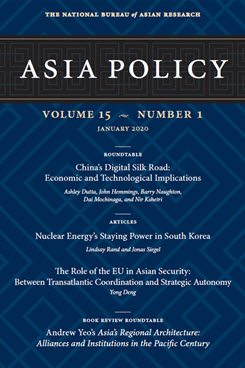The Expansion of China’s Digital Silk Road and Japan’s Response
This essay provides a Japanese perspective on how China is expanding its technology influence among countries involved in its Belt and Road Initiative and how Japan has responded.
EXECUTIVE SUMMARY
MAIN ARGUMENT
China has been highly proactive in influencing global technology among countries involved in its Belt and Road Initiative. The Digital Silk Road supports Beijing’s comprehensive internationalization through economic and technological integration. Chinese companies have begun expanding their information and communications technology (ICT) ecosystem to Digital Silk Road countries, including physical infrastructure such as fiber-optic cables and servers as well as software and applications developed by Chinese firms. China’s strategy includes strengthening national soft power to give China greater appeal and foreign influence. The Digital Silk Road both links countries closer to China via ICT and gives China involvement in these countries’ technological development. Japan has prioritized cybersecurity issues and has put forward its own international strategy on development and regional security, the “free and open Indo-Pacific” vision, which includes critical ICT components such as new fiber-optic cable construction in the region.
POLICY IMPLICATIONS
- ICT is key to increasing China’s influence in technology, industries, standards, and legal frameworks. Chinese legal systems and technology standards are particularly attractive to regional countries with authoritarian political systems given that China has successfully created a model that achieved both economic development and information control.
- China’s field for strategic competition in the cyber domain is not only technology development but also standards-setting and legal frameworks.
- Japan has put forward its free and open Indo-Pacific vision and behaved cautiously so as not to confront China. At the same time, it is trying to find ways to cooperate in international 5G deployment with countries that are maintaining distance from the Digital Silk Road. Japan can be expected to continue to pursue cooperative relations with other countries through strategic competition rather than through direct confrontation with China.
Dai Mochinaga is a Senior Researcher at Keio Research Institute at SFC. He was formerly a researcher at Mitsubishi Research Institute for ten years. As a consultant for the Japanese government, he contributed to cybersecurity policy development, including technology development, critical infrastructure protection, and government standards. His book Rulers of Cyberspace: Power across Borders (in Japanese, 2018) describes the controlling factors of cyberspace and the U.S.-Europe-China power transition.
About Asia Policy
Asia Policy is a peer-reviewed scholarly journal presenting policy-relevant academic research on the Asia-Pacific that draws clear and concise conclusions useful to today’s policymakers. Asia Policy is published quarterly in January, April, July, and October and accepts submissions on a rolling basis. Learn more



